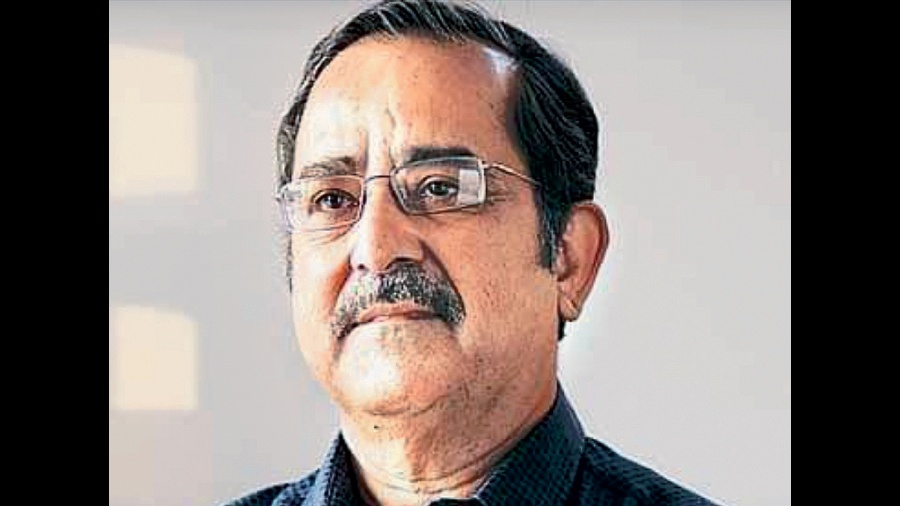The Bengal economy is in a fiscal crisis, observed economist and BJP MLA Ashok Lahiri on the floor of the Assembly on Thursday while initiating a discussion on the state budget on behalf of the main opposition party.
“The state is in a fiscal crisis.... They (government) cannot pay DA (dearness allowance), cannot appoint doctors. They talk about Rastashree (a new scheme announced in the budget by finance minister Chandrima Bhattacharya on Wednesday), but the roads are in a shambles,” said Lahiri, the Balurghat MLA and a member of the Fifteenth Finance Commission.
One of the major claims of the Trinamul Congress regime has been its success in changing the economic fortunes of Bengal since the change of guard in 2011. Former state finance minister Amit Mitra never missed an opportunity — be it at the state’s annual business summit or in his budget speeches — to claim that the rate of growth of the Bengal economy had been higher than the national average.
The state’s claims of success in attracting investments, eliminating poverty and creating employment opportunities also featured extensively in Trinamul’s political campaigns or the government’s propaganda documents.
In her budget speech on Wednesday, Bhattacharya followed the tradition.
“When all India Index of Industrial Production (Manufacturing) growth during 2022-23 (April to November) is 5.0 per cent, West Bengal’s growth has been 7.8 per cent during the same period,” she said at the beginning of her address.
Although scores of Opposition leaders have been expressing their doubts about the veracity of these claims for several years, Lahiri’s critique in the Assembly of the state’s economy during his 30-minute address stood out as he buttressed his argument with data.
“In Bengal, there seems to be a tradition of the revised estimates of revenue receipts lagging behind the budget estimates,” said the BJP MLA, before rolling out numbers to prove his hypothesis that the state government was consistent in earning less than its target while spending more (on revenue account) than estimated in the budget calculations.
According to Lahiri, who had earlier worked as the chief economic adviser to the central government, this precarious situation — low income, higher revenue expenditure and the mounting debt burden — resulted in a drastic reduction in capital expenditure in the 2022-23 fiscal.
“Will the same trend be followed and the capital expenditure would be slashed by around two-thirds in 2023-24?” asked the BJP MLA.
Quoting numbers from the budget documents, he also highlighted how Bengal was more dependent — in comparison to other states like Maharashtra, Gujarat, Karnataka and Tamil Nadu — on Finance Commission awards and grants-in-aid from the Centre than its own tax revenue.
While Lahiri was eloquent on how Bengal had been faltering in terms of its economic scorecard, there was no comment on the state’s allegation that the Centre had put a freeze on the flow of funds from Delhi, which is wreaking havoc on Bengal’s rural economy.
The line of Lahiri’s argument made it clear that he was trying to create a narrative around capital expenditure — which the saffron ecosystem hailed as the high point in Union finance minister Nirmala Sitharaman’s budget for the next fiscal even as questions arose on the Centre’s decision to slash spending on welfare measures — to project Bengal as a laggard state, where lack of development is resulting in lower revenue generation.
Lahiri began his address with a statistical nugget from 2019 when per capita income of Bangladesh was more than that of Bengal and then went on to explain how its position, in terms of per capita income among Indian states, worsened between 2011 and 2018.
The treasury benches must have felt the absence of Mitra from the House during the budget discussions on Thursday. Had Mitra been at the House, he would have surely reminded Lahiri about another IMF report of 2020, which projected Bangladesh marching ahead of India in terms of per capita income.
Unlike most of his party colleagues, Lahiri came prepared for the discussion and expanded the scope of his criticism of the budget by shifting focus from economic growth figures to the human development index (HDI) score — a summary measure of human development that takes into account factors like health and education — of Bengal.
Then, Lahiri spoke extensively on how Bengal was lagging behind other states in terms of quality of education and healthcare delivery. He presented a comparison among states in terms of the number of MBBS seats to drive home the point that Bengal has been lagging behind other states in terms of healthcare.
“This government is only about claims.... They are claiming that Bengal has been Number One in MGNREGA. But they are not saying that states can win prizes in nine categories,” said Lahiri.
Such claims — without presenting the full picture — however, are not unique for Bengal alone.
Several BJP leaders, including Prime Minister Narendra Modi, often follow the same model.
A case in point is the recent debate in the Lok Sabha in which Modi referred to a paper in Harvard over the decline of the Congress.
The fact that there have also been papers on the rise of intolerance in India or the threats to democracy in India from the stable of Harvard and other eminent US universities hadn’t found any mention in the address.
Sources in Trinamul said though Mitra’s absence was felt in the House, Bhattacharya, in her reply, would respond to all the queries.










